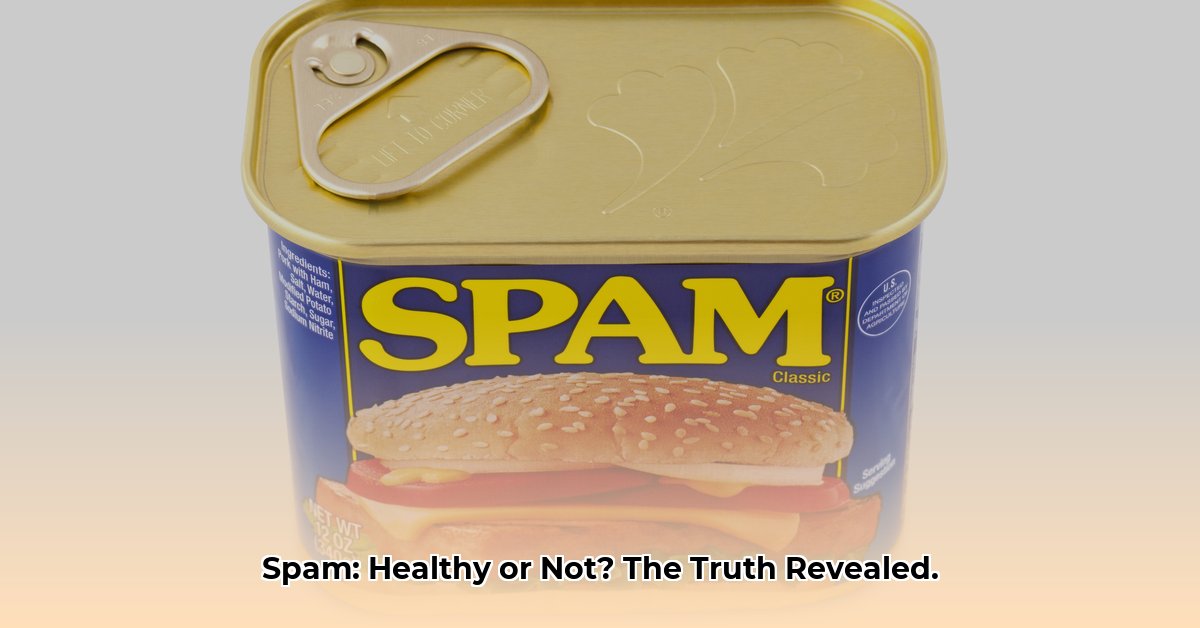Is Spam a nutritional powerhouse or a dietary disaster? The short answer is: probably not. While Spam offers some protein and micronutrients, its high sodium, saturated fat, and processed meat content raise significant health concerns, likely outweighing any potential benefits.
Debunking the Spam Myth: Separating Fact from Fiction
Spam, that iconic canned meat, has a long and fascinating history. From its wartime origins to its current role in various cultural cuisines, it’s a food with a story. But its cultural significance doesn’t negate its nutritional drawbacks. Let’s separate fact from fiction and examine Spam’s true nutritional impact.
Spam’s Nutritional Lowdown: A Look Under the Lid
A quick glance at Spam’s nutritional label reveals a less-than-stellar profile. Here’s what you’ll find in a typical 2-ounce serving:
| Nutrient | Amount per serving (around 2 oz) | % Daily Value | Why it Matters |
|---|---|---|---|
| Calories | 180 | ~9% | A moderate amount, but it can add up quickly. |
| Total Fat | 16g | ~25% | High in fat, much of which is saturated. |
| Saturated Fat | 7g | ~35% | Contributes to high cholesterol. |
| Cholesterol | 40mg | ~13% | Adds to your daily cholesterol intake. |
| Sodium | 790mg | ~35% | Very high; a major health concern. |
| Total Carbohydrate | 2g | ~1% | Very low in carbs. |
| Protein | 7g | ~14% | Provides some protein, but healthier sources exist. |
The Sodium Saga: A Salty Tale
That 790mg of sodium per serving is a serious red flag. High sodium intake is strongly linked to high blood pressure, increasing the risk of heart disease and stroke. While our bodies need some sodium, most of us consume far more than necessary, and Spam significantly contributes to this excess.
Fat Facts: The Not-So-Good Kind
Spam is high in saturated fat, the type that raises “bad” LDL cholesterol, increasing the risk of heart disease. While some fat is essential, prioritizing healthy fats is crucial for long-term health.
Processed Meat Problems: What You Should Know
Spam belongs to the processed meat category, which the World Health Organization classifies as a Group 1 carcinogen, suggesting a link to an increased risk of certain cancers, particularly colorectal cancer. This is likely due to the formation of harmful compounds, such as nitrosamines, during processing.
The Protein Puzzle: Quality Matters
While Spam provides protein, its overall nutritional profile makes it a less-than-ideal source. Lean meats, fish, beans, and lentils offer higher-quality protein without the accompanying health risks.
Health Risks of Spam: A Deeper Dive
Consuming Spam regularly, especially in large quantities, poses several potential health risks. Let’s delve deeper into the specific concerns:
-
Cardiovascular Disease: The high sodium and saturated fat content in Spam significantly contributes to high blood pressure and high cholesterol, both major risk factors for heart disease and stroke.
-
Cancer: As a processed meat, Spam contains nitrites, which can form cancer-causing nitrosamines. Research suggests a link between processed meat consumption and an increased risk of certain cancers, notably colorectal cancer. Ongoing research continues to explore this connection.
-
Other Health Issues: Some studies suggest a possible link between processed meat consumption and other health problems like type 2 diabetes. Further research is needed to fully understand these potential links.
Healthier Alternatives: Upgrading Your Plate
Fortunately, plenty of healthier protein sources exist. Consider these alternatives to Spam:
- Grilled Chicken Breast: Lean protein with fewer calories and less fat.
- Baked Salmon: Rich in omega-3 fatty acids, beneficial for heart health.
- Black Bean Burgers: A plant-based option packed with fiber and protein.
- Lentil Soup: A hearty and flavorful source of protein and fiber.
These alternatives provide essential nutrients without the high sodium, saturated fat, and processed meat baggage.
The Bottom Line: Moderation is Key
While an occasional small serving of Spam as part of a balanced diet might not cause significant harm, making it a regular habit is probably not the best choice for your health. If you enjoy Spam, moderation is key. Limit your portions and focus on incorporating plenty of fruits, vegetables, and whole grains into your diet. For optimal health, consider choosing healthier protein alternatives most of the time. Remember, ongoing research continues to shed light on the complexities of nutrition, so staying informed about the latest dietary guidelines and consulting with a healthcare professional or registered dietitian is always recommended.
- The Best Bento Box Price For Your Perfect Packed Lunch - December 15, 2025
- Bento Box Shopping Tips for Smart and Stylish Lunch Prep - December 14, 2025
- Bento Box Trays Streamline Restaurant Meal Presentation and Transport - December 13, 2025










